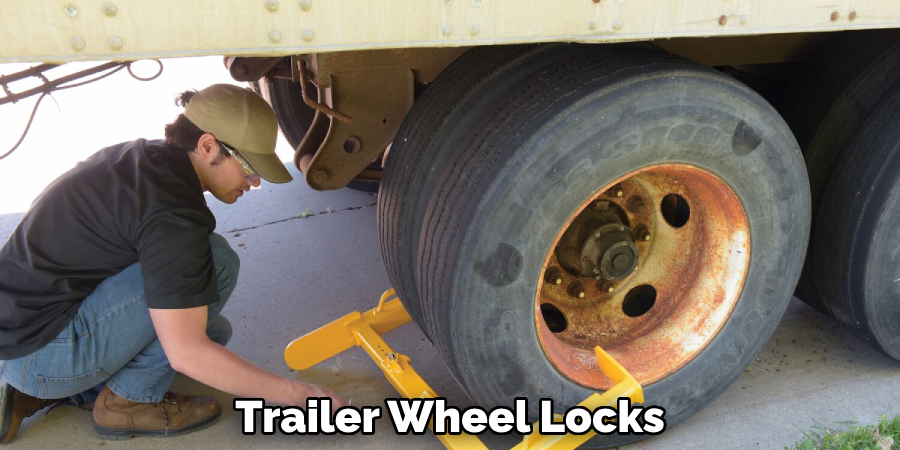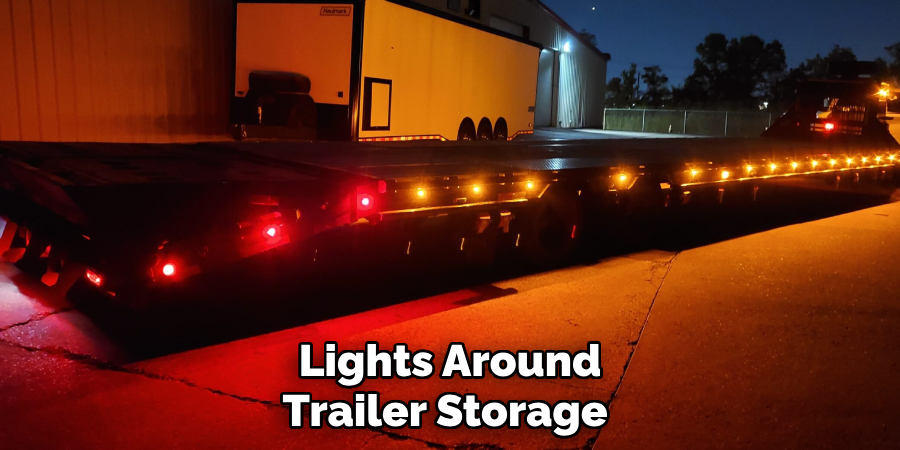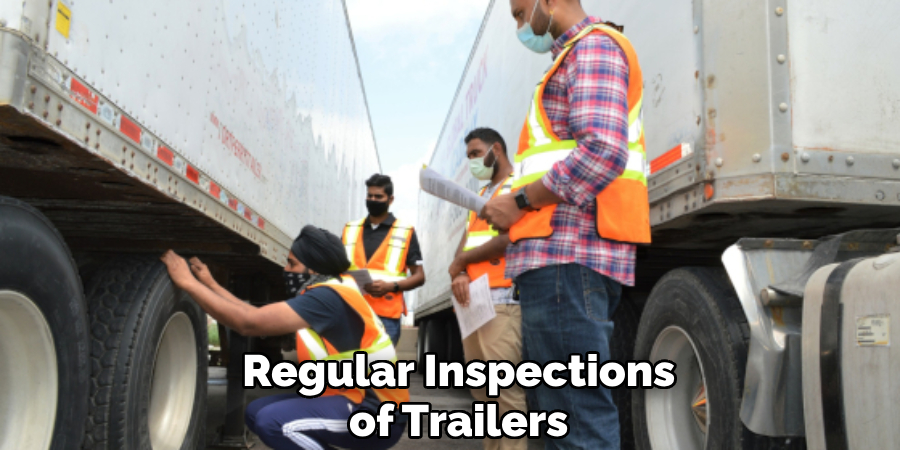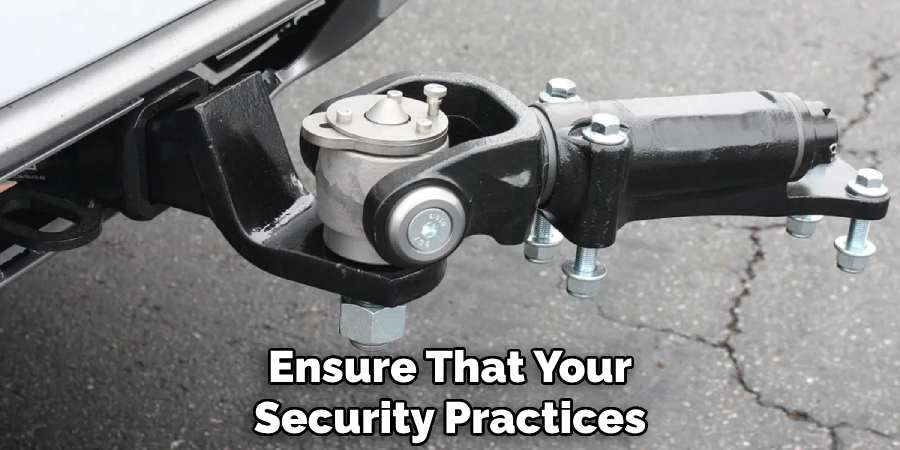Securing a trailer from theft is imperative to owning and operating these valuable assets. Trailers, often used for transporting goods, vehicles, or recreational equipment, become prime targets for thieves due to their high value and the ease with which they can be towed away. Understanding how to secure a trailer from theft safeguards your property and ensures the continuity of your business or personal endeavors.

The importance of protecting trailers from unauthorized use and theft cannot be overstated, as the repercussions of losing a trailer go beyond immediate financial loss. This section dives into the various strategies that can significantly enhance trailer security, deter potential thieves, and give trailer owners peace of mind. From physical security measures to innovative technology-based solutions, we’ll explore the most effective ways to keep your trailer safe from theft.
Assessing Security Risks
To combat trailer theft effectively, it is crucial to first understand the common methods and motivations behind these crimes. Thieves often target trailers because of their high value, ease of resale, and relative simplicity with which they can be detached and towed away by another vehicle.
The motivations range from opportunistic thefts to fulfill short-term financial needs to more organized criminal activities involving the resale of stolen trailers or their contents.
A. Understanding Common Methods and Motivations for Trailer Theft
Thieves typically employ a few standard methods to steal trailers. The most straightforward approach involves uncoupling the trailer from its parked position and towing it away using another vehicle. This method is particularly favored in areas where trailers are left unattended, poorly secured, or in remote locations. Another common technique is using specialized tools to bypass locks or break them entirely.
In more sophisticated operations, thieves might falsify ownership documents to sell stolen trailers more easily on the black market or to unsuspecting buyers.
B. Evaluating Vulnerabilities in Trailer Design, Storage Location, and Usage Patterns
Vulnerabilities in trailer security often stem from the trailer design, its storage location, and usage patterns. For instance, trailers lacking built-in security features such as sturdy locks or tracking devices are more susceptible to theft. Storage locations also play a significant role; trailers parked in isolated, poorly lit areas without surveillance are at higher risk.

Additionally, predictable usage patterns, such as leaving a trailer unattended for predictable periods, can make it an easy target for theft.
C. Identifying High-Risk Areas or Situations Where Trailers Are Most Susceptible to Theft
High-risk areas for trailer theft include parking lots with minimal security features, unguarded industrial sites, and residential areas where trailers are visible from the street and not securely parked behind gates or within garages.
Situations that exacerbate the risk include large events where trailers are used to transport equipment and left unattended for long durations and locations undergoing construction where trailers are temporarily stored with tools or materials inside. Recognizing these high-risk areas and situations is vital in developing a tailored security strategy to mitigate the risk of theft effectively.
How to Secure a Trailer from Theft: Implementing Physical Security Measures
Implementing effective physical security measures is a crucial step in learning how to secure a trailer from theft. These measures provide a strong first line of defense, deterring would-be thieves by making the act of theft significantly more difficult.
Among the most effective measures are hitch locks, wheel locks, and coupler locks, each serving to immobilize the trailer in different ways, thereby reducing its attractiveness as a target for theft.
A. Hitch Locks:
Installing high-quality hitch locks is one of the simplest yet most effective measures you can take. These locks fit onto the trailer’s hitch, preventing any unauthorized vehicle from coupling with the trailer. Various types of hitch locks are available, including universal locks that fit most trailers and more specific designs tailored to unique hitch types.
Opting for a robust, weather-resistant hitch lock with a highly secure locking mechanism is crucial. This secures the trailer and acts as a visible deterrent to potential thieves, who are likely to bypass more secure trailers in search of an easier target.
B. Wheel Locks:
Like the devices law enforcement uses to immobilize vehicles, wheel locks or wheel clamps are designed to fit around the trailer’s wheel, making it impossible to move the trailer without removing the lock. These devices vary in size and design but are universally effective in stealthily preventing a trailer from being towed away.

When choosing a wheel lock, it’s important to select a model that is highly visible, robust, and designed to resist tampering or removal with common tools. The presence of a wheel lock not only immobilizes the trailer but also serves as a clear signal to potential thieves that the trailer owner has taken steps to secure their property.
C. Coupler Locks:
Coupler locks are designed to prevent the trailer’s coupler from being attached to a hitch. By securing the coupler, these locks effectively deter theft attempts. Coupler locks come in various designs, including encasing the entire coupler and blocking access to the coupler attachment point.
Choosing a coupler lock that is made of hardened steel and has a tamper-resistant design will provide the highest level of security. Like hitch and wheel locks, the visible presence of a coupler lock serves as a deterrent to theft, signaling that the trailer is well-protected and not an easy target.
While effective individually, these locking mechanisms provide the highest level of security when used together. By combining hitch, wheel, and coupler locks, trailer owners can significantly enhance their trailer’s security, making it far less attractive to potential thieves and providing much-needed peace of mind to the owner.
How to Secure a Trailer from Theft: Utilizing Theft Deterrents
Implementing additional measures that serve as theft deterrents can significantly enhance the security of your trailer. These deterrents make stealing the trailer more challenging and increase the likelihood of detecting and responding to a theft attempt in real time.
Here, we discuss the benefits of alarms and tracking devices, security cameras, and motion-activated lights as crucial components of a comprehensive theft prevention strategy.
A. Alarms and Tracking Devices:
Installing audible alarms or GPS tracking devices on trailers provides a two-fold defense mechanism. Audible alarms serve to immediately alert nearby individuals to unauthorized attempts to move or tamper with the trailer, potentially scaring off the thief before they can complete their act.

On the other hand, GPS tracking devices offer a more silent but effective method of theft deterrent. They allow for real-time tracking of the trailer’s location, enabling owners and authorities to quickly locate and recover stolen property. The mere presence of these devices, often indicated by stickers or signs, can significantly deter would-be thieves.
B. Security Cameras:
Equipping trailer storage areas with security cameras is another effective strategy to deter theft and facilitate the identification and prosecution of thieves. Modern security cameras can provide high-definition video feeds accessible remotely via smartphones or computers, ensuring owners can monitor their trailers’ security from anywhere at any time.
The visibility of security cameras is a strong deterrent to potential thieves, and the recorded footage can be invaluable to law enforcement in the event of a theft.
C. Motion-Activated Lights:
Using motion-activated lights around trailer storage areas is a simple yet effective way to deter potential thieves. These lights illuminate the area surrounding the trailer in response to movement, which can startle and deter anyone attempting to approach the trailer with the intent of theft.

The sudden illumination makes the area less appealing to thieves and increases the likelihood that their actions will be noticed by passersby or caught on camera. The effectiveness of motion-activated lights as a deterrent is significantly enhanced when used in conjunction with other security measures, creating a layered defense system that protects trailers from theft.
By integrating these theft deterrents into your trailer security strategy, you can create a robust defense that not only prevents theft but also aids in recovering your property should a theft occur. These technologies serve to make your trailer a far less attractive target to thieves, offering peace of mind and security for your valuable assets.
How to Secure a Trailer from Theft: Securing Trailer Storage Locations
A. Fencing and Gates
One of the most effective measures for enhancing the security of trailer storage locations is the erection of fences and the installation of gates. Fences serve as a physical barrier that limits access to the trailer storage area, effectively preventing unauthorized entry.
Combining fencing with secure, lockable gates further strengthens this barrier, ensuring that access is restricted to authorized personnel only. Materials such as chain-link, wrought iron, or sturdy wood can offer both robust protection and visual deterrence to potential trespassers. Additionally, incorporating barbed wire or anti-climb spikes can enhance the efficacy of fences as a security measure.
B. Secure Parking
Choosing the right parking location is critical in safeguarding trailers from theft or vandalism. Well-lit areas deter potential thieves, who prefer to operate under the cover of darkness. Secured storage yards, often equipped with 24-hour surveillance and access control, provide an ideal environment for storing trailers.
Alternatively, parking trailers in gated communities or commercial parking lots with security personnel can offer similar levels of security. The key is to select a location that is secure, offers visibility, and is well-regarded for its safety standards.

C. Neighborhood Watch Programs
Participation in neighborhood watch programs or community safety initiatives is invaluable for enhancing trailer security. These programs foster a sense of community responsibility and vigilance, encouraging residents and business owners to look out for each other’s property.
Sharing information about suspicious activities can significantly deter crime in the area, including attempts at trailer theft. In some cases, local law enforcement agencies may support neighborhood watch programs, providing signs, stickers, and even periodic patrols to enhance community security.
Building a network of vigilant neighbors creates a multi-layered defense mechanism, reducing the likelihood of theft and increasing the chance of immediate detection and response to any suspicious activities.
Concealment and Disguise
Incorporating methods of concealment and disguise can play a pivotal role in theft prevention by making trailers less visible and attractive to potential thieves. Here, we explore strategies such as using trailer covers, employing camouflage techniques, and strategic placement to enhance security through obscurity.
A. Trailer Covers
Utilizing trailer covers or tarps provides a simple yet effective method to conceal trailers from view. These covers shield the trailer from the elements and reduce its visibility, making it less of a target for thieves.
Trailer covers add an extra layer of uncertainty for potential thieves by masking identifying features and contents, significantly decreasing the trailer’s attractiveness as a theft target. Additionally, covers designed with locks or securing mechanisms offer an additional barrier to unauthorized access.
B. Camouflage
Blending trailers into their surroundings or disguising them can significantly lower their profile to potential thieves. This can be achieved by using decals or paint schemes that mimic the environment where the trailer is regularly parked.
For urban settings, colors and patterns that merge with the concrete surroundings can be effective, while for rural settings, green and brown hues or even camouflage patterns can help the trailer blend in with natural elements. This strategy makes the trailer less noticeable, thereby reducing the likelihood of theft.
C. Strategic Placement
The strategic placement of trailers behind other vehicles, buildings, or natural barriers can effectively conceal them from the view of passersby and potential thieves. Parking trailers in less visible locations significantly reduces the chances of a thief spotting and targeting the trailer.
This method relies on natural and man-made landscape features to shield the trailer, making it harder for thieves to commit quick and unnoticed theft. Combining strategic placement with other security measures further enhances the overall protection of the trailer.
Employing these concealment and disguise techniques can effectively complement the security measures outlined earlier, adding another layer of defense against theft. By making trailers less visible and attractive to thieves, owners can significantly reduce the risk of their trailers being targeted.
Regular Inspections and Maintenance
Ensuring the security and longevity of trailers involves implementing robust security measures and conducting regular inspections and maintenance. Here, we outline key practices that trailer owners should adopt to safeguard their assets effectively.
A. Routine Checks
Regular inspections of trailers are crucial for identifying signs of tampering, damage, or wear that could compromise security or functionality. Owners should regularly check locks, hinges, and any attached security devices for signs of damage or attempts at tampering.

Inspecting the trailer’s structural integrity, including tires, flooring, and the frame, is also essential to ensure it remains in optimal condition. Regular checks help in the early detection of potential issues, allowing for immediate action to prevent theft or damage.
B. Maintenance Practices
Maintaining trailer security measures, such as locks, alarms, and GPS trackers, in good working condition is vital for their effectiveness. Regular maintenance includes testing security devices to ensure they function correctly, replacing batteries in alarms and GPS units, and lubricating locks and hinges to prevent seizing.
This practice extends the life of these security measures and ensures that they provide the intended protection without fail.
C. Reporting Suspicious Activity
Promptly reporting suspicious behavior or security concerns to authorities or property owners is critical to a comprehensive security strategy. Vigilance and quick action can prevent theft or vandalism, and reporting such activities can aid in apprehending suspects and discourage future attempts.
Trailer owners should remain observant of their surroundings and report any unusual activities or individuals loitering near trailer storage areas. Collaboration with local law enforcement and community vigilance initiatives can significantly enhance trailers’ security and storage locations.
Together, these practices of regular inspections, diligent maintenance, and reporting suspicious activities form a crucial framework for securing trailers against theft and ensuring their continued utility and value.
Legal and Ethical Considerations
Protecting your trailer involves physical security measures and adherence to legal and ethical standards. It is paramount to ensure that your security practices comply with local, state, and federal regulations.

This means staying informed about and following any guidelines that pertain to the deployment of surveillance equipment, the use of security devices, and the handling of personal data, such as that collected by GPS trackers. Compliance safeguards you against legal repercussions and ensures your security measures are legally sound.
A. Compliance with Regulations
Trailer owners must actively comply with local, state, and federal regulations concerning trailer security measures. This could involve obtaining permits for surveillance cameras, ensuring GPS tracking devices follow privacy laws, and adhering to lighting regulations.
Familiarizing oneself with these regulations prevents inadvertent legal issues and ensures that your security measures are both effective and lawful.
B. Respect for Property Rights
Respecting the property rights of others is fundamental. This includes avoiding scenarios where your security measures might inadvertently infringe upon the privacy and property rights of your neighbors or the public.
Ensuring that cameras or motion sensors are correctly positioned to monitor only your property and not beyond its boundaries is a critical consideration in this regard.
C. Ethical Considerations
Ethically implementing security measures involves acting responsibly to protect personal property without encroaching on the rights and privacy of others. It also entails using security devices and strategies that are appropriate to the threat level and not excessive to the point of causing undue concern or harm to others.
Ethical considerations mean choosing security solutions that are effective, non-invasive, and respect the broader community’s rights and sensibilities.
Conclusion
In our comprehensive guide, we have explored various strategies and techniques on how to secure a trailer from theft, emphasizing the critical role of proactive security measures and vigilance. From basic locking mechanisms to advanced GPS tracking systems, each method creates a formidable barrier against potential thieves.
Regular inspections, maintenance, and adherence to legal and ethical standards further ensure that your trailer remains secure and safeguarded against the risks of theft.
The significance of proactive implementation of these security measures cannot be overstated. It is the combination of physical security devices, vigilant practices, and a community-focused approach that considerably reduces the likelihood of theft. Remember, the goal is to protect your trailer and provide you with peace of mind, knowing your valuable assets are well-protected.By following the outlined recommendations, you are taking a critical step towards securing your trailer from theft, ensuring its safety, and preserving its value for years to come and wishing you peace of mind and security in safeguarding your trailer assets!
About
Safety Fic is a distinguished figure in the world of Diy design, with a decade of expertise creating innovative and sustainable Diy solutions. His professional focus lies in merging traditional craftsmanship with modern manufacturing techniques, fostering designs that are both practical and environmentally conscious. As the author of diy, Safety Fic delves into the art and science of Safety Fic-making, inspiring artisans and industry professionals alike.
Education RMIT University
(Melbourne, Australia) Associate Degree in Design (Safety Fic) Focus on sustainable design, industry-driven projects, and practical craftsmanship. Gained hands-on experience with traditional and digital manufacturing tools, such as CAD and CNC software.
Nottingham Trent University
(United Kingdom) Bachelor’s in diyfastly.com and Product Design (Honors) Specialized in product design with a focus on blending creativity with production techniques. Participated in industry projects, working with companies like John Lewis and Vitsoe to gain real-world insights.
Publications and Impact
In diy, Safety Fic his insights on indoor design processes, materials, and strategies for efficient production. His writing bridges the gap between artisan knowledge and modern industry needs, making it a must-read for both budding designers and seasoned professionals.
